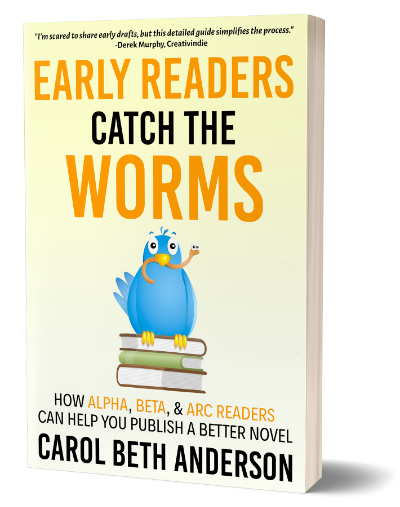This is Part 1 of a series for indie authors. To read the series intro, click here.
Finding critique partners or alpha readers can be scary! Your book is your baby, but you know it’s pretty rough because it’s in early-draft phase. Sharing it requires vulnerability. However, I’ve found my alpha team immensely valuable in crafting better books.
If you’re just starting out, it may work best to gather one or two trusted friends or family members (who will give you honest feedback) to be your alpha readers. Give them chapters or chunks of the book as you write it, and get their feedback.
My most faithful alpha readers at first were my sister and my mom. My sister in particular has a good eye for story issues and gave me a lot of extremely valuable feedback.
People will say, “Don’t ask friends and family for critiques! They won’t be honest!” But I say, start with what you’ve got! You’re a new author–you don’t have a fan base yet. But you do know people!
However, there are also ways to connect with other writers. I find Twitter to be an amazing writing community. (I’m @CBethAnderson.) Hop on, introduce yourself using the hashtag #WritingCommunity, and find some friends. Maybe some of them can be your alpha readers or critique partners!
Now that I have books released, I have a private Facebook group for my alpha readers. (I tried this method when I started writing, but it really didn’t work well. It was easier to build an alpha community once I’d earned their trust by publishing a trilogy they enjoyed!)

Here are the details of how I work with alpha readers:
Where can I find alpha readers?
- At first, I invited my street team (see Part 3 of this series) to be alpha readers. I was honest with them: “You’ll be reading books in chunks, which isn’t always a satisfying way to read. It’ll be rough, with lots of errors!”
- People joined my alpha reader group. After several months, I reached out to anyone who hadn’t given feedback to ask if they still wanted to be in the group. I took out those who decided it wasn’t for them (no hard feelings.)
- Now, my alpha reader group is invitation-only. After I culled the inactive members, I invited a few excellent beta readers I thought would make good alpha readers.
How alpha reading works in my Facebook Group:
- I post instructions in the group. I tell them I’m looking for “big picture” feedback at this phase, such as plot pacing, characterization, and worldbuilding. I don’t want feedback on grammar or typos; it’s too early to worry about that stuff!
- When I’ve completed about 1/4 of a book (1/2 if it’s a very short novella), I format it as mobi (for Kindle), ePub, and PDF (print version). (Yes, you can distribute in other forms, such as Word or Google Docs, but I find most readers prefer to read on a device, and ePub and mobi are ideal for that.)
- I use StoryOrigin to create a page where my alpha readers can download the partial manuscript.
- I share the download link in the private Facebook group and encourage people to read and review. I tag everyone in the group when I post so they don’t miss it!
- Alpha readers give feedback within the Facebook group. That way, we get into some good conversations. The readers often agree with each other, and sometimes they disagree. All that is helpful to me!
- I always respond to feedback, thanking the alpha reader and usually addressing specific elements of their feedback.
- As I write, I continue to provide the book to readers a quarter at a time. (But when I publish the second quarter, I also include the first quarter, so someone who hasn’t started reading yet has it all in one place.)
- I use a ton of this feedback as I revise for beta readers, and sometimes I update alpha readers on how I utilized their specific feedback!
Want more step-by-step instructions and resources that will help you create a successful alpha reader group? My new book, Early Readers Catch the Worms, includes…
- Access to a Resource Pack full of editable resources and templates to help you build early reader teams.
- Detailed pros and cons of various formatting programs (some of them free!)
- Suggestions for how to set up and maintain your alpha reader group.
Buy your copy of Early Readers Catch the Worms: How Alpha, Beta, & ARC Readers Can Help You Publish a Better Novel by clicking here!

If you’re ready for more, click here to go to Part 2 of this series: BETA READERS.
Want to be notified every time I post an Author Resource?
Author Resources on my website are 100% free. But if you’d like to buy me a coffee to thank me, click the “Tip Me” button below!
